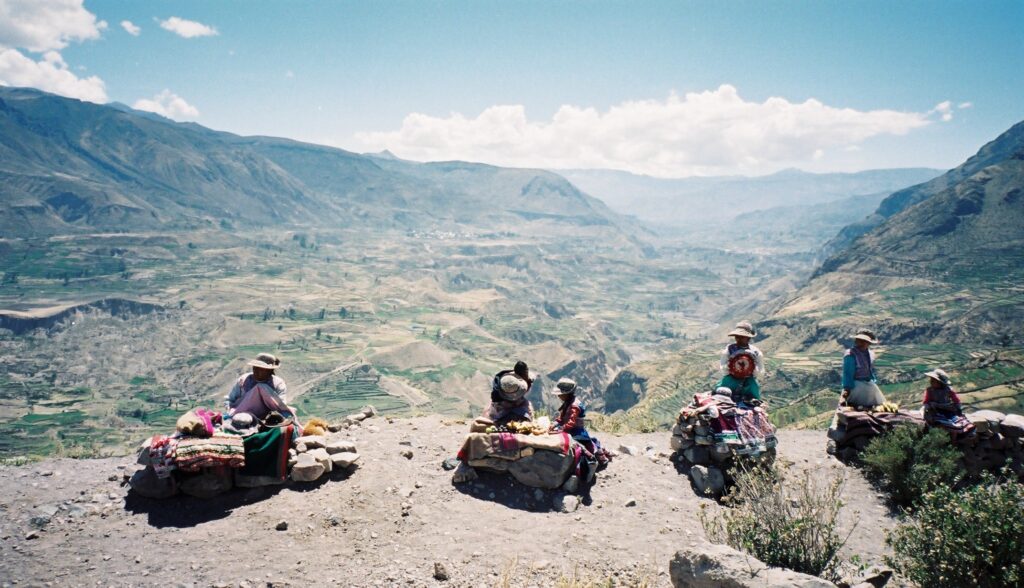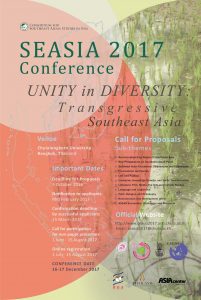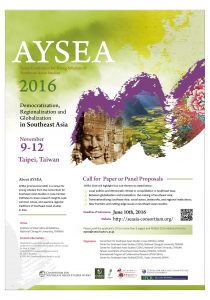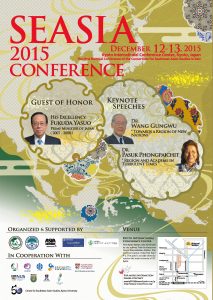MOU: Memoranda of Understanding

CSEAS actively promotes Southeast Asian studies by establishing institutional linkages with leading universities and research institutes in the region as well as the world. The Center has signed memoranda of understanding (MOUs) aimed at fostering academic exchange and cooperation through programs of exchange of faculty members and researchers; exchange of academic information, including library materials and research publications; and joint research activities including seminar, conference and symposium. Among the institutions with which CSEAS has recently signed MOUs are the School of Humanities and Social Sciences, Nanyang Technological University (Singapore); Institute of Asian Studies, Universiti Brunei Darussalam; University of Social Sciences and Humanities, Vietnam National University; Hanoi Agricultural University (Vietnam); Gorontalo State University (Indonesia); University of the Philippines; Cebuano Studies Center, University of San Carlos (Philippines); the Royal University of Fine Arts and the Royal University of Agriculture (Cambodia); Ministry of Health (Bhutan); Center for Asia-Pacific Studies, Academia Sinica (Taiwan); Graduate Institute of Southeast Asian Studies, National Chi Nan University (Taiwan); Research School for Southeast Asian Studies, Xiamen University (China); Institute for Southeast Asian Studies, Jinan University (China); Center for Asia-Pacific Studies and the School of Government, Sun Yat-sen University (China); Institute for Southeast Asian Studies, Yunnan University (China); College of Food Science and Technology, Shanghai Ocean University (China); Institute for East Asian Studies, Sogang University (South Korea); Southeast Asia Program, Cornell University (USA); Center for Southeast Asian Studies, University of California-Berkeley (USA); the International Institute for Asian Studies,The Netherlands,; and the Southeast Asian Studies Program, University of Freiburg (Germany).
Last Updated: 28 October, 2020
Japan Consortium for Area Studies(JCAS)

Japan Consortium for Area Studies (JCAS) was established in 2004 as anetwork of organizations working on area studies in Japan. Currently about100 organizations of universities, research institutes, academic societies,and civic organizations are members. Through collaborative research, JCASaims to nurture the next generation of researchers and produce socialcollaboration between organizations and ensure that knowledge and resourcesare fully utilized to revitalize organizations. At present, CSEAS is thesecretariat of JCAS after integrating with the Center for Integrated AreaStudies (CIAS), which previously served as the secretariat since thefounding of JCAS.
Consortium for Southeast Asian Studies in Asia (SEASIA)
Over the past few decades, in tandem with ever-deepening economic integration and increasing cross-border flows and movements of people, goods, ideas, and technologies, a number of leading organizations, communities, and individuals in East Asia (Northeast and Southeast Asia) have been initiating, cementing, and institutionalizing both regional and global linkages and collaborations at the governmental and non-governmental levels, particularly in business, academia, and the arts.
Network-style academic cooperation has become de rigueur among area specialists as well. But so far, academic cooperation in the East Asia region has mainly taken the form of bundles of bilateral (or at most trilateral) exchanges and collaboration, involving great expenditure of time, energy, and funds. There are many overlaps in the thematic focus of conferences, symposia and workshops sponsored individually or jointly by area studies institutions. Some of the unintended consequences of this noodle-bowl phenomenon include intellectual fragmentation and segmentation even within one particular topic of “area studies.” Fragmentation and segmentation may actually impede the development of synergistic, inter- and multi-disciplinary, and comparative approaches to area studies –goals and endeavors that are in fact held and pursued in common by all of us scholars who are keen to promote area studies. In an era of budget cuts, it makes more sense for area studies institutions to work together.
The study of Southeast Asia is an integral part of Asian studies and is represented in various international academic meetings. Furthermore, there are many region-based institutions that have provided excellent platforms for promoting Southeast Asian studies. However, the establishment of a region-based consortium of Southeast Asian Studies aims to complement these regional and global efforts by linking these hubs into a cooperative venture. It will provide a multilateral regional forum in the form of annual meetings, along with smaller joint workshops or conferences; a system for sharing information about each other’s activities; opportunities for education and training of young and up-and-coming scholars -for promoting collaboration and exchanges among Southeast Asia- and other East Asia-based Southeast Asianists.
More importantly, we seek to connect institutions specializing in the natural sciences, social sciences, and humanities—for example, earthquake science and disaster management, medical research, urban studies, ecology, energy, resource management, industry specialists, creative industries—whose scholars have an interest in, and who work on or in Southeast Asia, but do not necessarily consider themselves as area studies specialists.
Logistically, it is more convenient and affordable for Southeast/East Asia-based scholars to meet and interact with each other in the region compared to traveling long distances and at huge expense to America and Europe (although this consortium welcomes the participation of American and European Southeast Asianists). Other places where Southeast Asian studies constitutes only one sub-regional branch of “area studies” among many other areas are subject to the vicissitudes of funding and institutional imperatives specific to the countries in which they are lodged. Yet, for scholars working on Southeast Asia who are based in East Asia, this “area” matters in geopolitical, economic, intellectual, institutional, social, cultural and affective terms, making it impossible to treat Southeast Asian studies as if this were something peripheral and external to what scholars, public intellectuals, policy-makers, and activists are doing in this region.
SEASIA will promote Southeast Asian studies by linking the leading area studies institutions in the region in a cooperative venture to provide a multilateral forum for organizing academic meetings, seminars, workshops, and symposia. The main outlet for this endeavour is the SEASIA Conference, which is hosted by member institutions every two years.
The consortium Charter was signed by the Center for Asia-Pacific Studies, Academia Sinica; the Center for Southeast Asian Studies, National Chengchi University; the Institute of Asian Studies, Universiti Brunei Darussalam; the Institute of Asian Studies, Chulalongkorn University; the Asia Research Institute, National University of Singapore; the Center for Southeast Asian Studies, Kyoto University; the Asian Center, University of the Philippines, Diliman; the School of Social Sciences, Nanyang Technological University; the Indonesian Institute of Sciences; the Taiwan Association of Southeast Asian Studies; the Institute of Southeast Asian Studies, Yusof Ishak Institute; the Southeast Asia Research Centre, City University of Hong Kong; the School of International Studies, Jinan University.
SEASIA Conference
SEASIA 2019 Conference
Title: “Change and Resistance: Future Directions of Southeast Asia”
Date: Dec. 5-7, 2019
Venue: Institute Of Sociology, South Wing, Humanities and Social Sciences Building, Academia Sinica, 128 Sec. 2 Academia Rd., Nankang, Taipei 11529, Taiwan
Organizer: SEASIA, National Chengchi University
Co-organizers: Academia Sinica, Taiwan Association of Southeast Asian Studies, Taiwan-Asia Exchange Foundation, Ministry of Education, Taiwan, Ministry of Science and Technology, Taiwan
Conference site:http://www.seasiaconsortium.org/
SEASIA 2017 Conference
Title: “Unity in Diversity:Transgressive in Southeast Asia”
Date: Dec. 16-17, 2017
Venue: Chulalongkorn University
Organizers: SEASIA, Chulalongkorn University
Co-organizers: The Thailand Research Fund, Thailand Convention & Exhibition Bureau), The Japan Foundation, Kyoto University
Conference site:http://www.seasia2017.arts.chula.ac.th/
AYSEA 2016
Title: “Democratization, Regionalization and Globalization in Southeast Asia”
Date: Nov. 9-12, 2016
Venue: National Chengchi University, Taiwan
Organizers: SEASIA, National Chengchi University, Taiwan Association of Southeast Asian Studies, International Program of Collaborative Research: IPCR, Center for Southeast Asian Studies, Kyoto University
SEASIA 2015 Conference
Date: Dec. 12-13, 2015
Venue: Kyoto International Conference Center, Japan
Organizers: SEASIA, Center for Southeast Asian Studies Kyoto University
Co-organizers: The Japan Foundation、The Resona Foundation for Asia and Oceania, The Japanese Society for Asian Studies, Kyoto University
Conference site:https://seasia-consortium.org/conference-2015/about-seasia-2015/
Reports:
CSEAS: http://www-archive.cseas.kyoto-u.ac.jp/www/2016/event/20151212-13/
Kyoto University: http://www.kyoto-u.ac.jp/ja/international/events_news/department/se_asia/news/2015/151213_1.html
Conference site:http://www.seasiaconsortium.org/


The Kyoto University Southeast Asia Forum

The former Kyoto University Southeast Asia Forum (FY2007-FY2015), now known as the Kyoto University Southeast Asia Network Forum (FY2015 to present) is an international forum. It promotes research results conducted by and with Kyoto Universities scholars to the general public in Southeast Asia based on collaborations between Kyoto University and alumni and alumna associations of Kyoto University in each country in Southeast Asia. The forums have been held twenty-four times in different Southeast Asian countries (see list below) since the first forum was conducted in Jakarta, Indonesia in November 2007. CSEAS has has been pivotal in facilitating the forums.
Since its establishment, Kyoto University has accepted a number of Southeast Asian students as foreign students or scholars. Most of them are active as public intellectuals in various fields such as education institutions, the government sector, and private business upon return to their home countries. Kyoto University has started to establish alumni and alumna associations in Southeast Asian countries and the forums have become great opportunities to rekindle the network among alumni and alumnae and also between them and Kyoto University to socialize and spread research results to Southeast Asian societies.
Kyoto University Southeast Asia Forum 2007−13
13th Kyoto University Southeast Asia Forum 2013: Stem Cell: From Research to Applications
Date:February 16, 2013
Place:The Twin Towers Hotel, Bangkok
Organizer:HAKU (Himpunan Alumni Kyoto University Indonesia)
Supported by:Kyoto University/Thai-Nichi Institute of Technology(TNI)
Program:PDF
12th Kyoto University Southeast Asia Forum 2013: Geological Disaster Problems in Indonesia and Their Countermeasures
Date:4−5 February 2013
Place:Institut Teknologi Sepuluh Nopember, Surabaya
Organizer:HAKU (Himpunan Alumni Kyoto University Indonesia)
Program:PDF
11th Kyoto University Southeast Asia Forum 2012: Best Practices on Resource Management in Lao PDR
Date:19 November 2012
Place:Vansana Riverside Hotel
Joint Hosting:Center for Southeast Asian Studies, Kyoto University(CSEAS)/ Kyoto University Network in Laos/Center for Statistics and Information Department of Planning Ministry of Agriculture and Forestry
Program:PDF
10th Kyoto University Southeast Asia Forum 2012: FLOODS!: Lessons Learned from Experiences
Date:17 March 2012
Place:Kasatsuk 2, 4th Floor, The Twin Towers Hotel Bangkok
Joint Hosting:Kyoto University and Kyoto Union Club
Program:PDF
Poster:PDF
9th Kyoto University Southeast Asia Forum 2012:Technical and Social Innovation on Utilization of Natural Resources
Date:28-29 January 2012
Place:Main Office, Mulawarman University
(Kampus Gunung Kelua Jl. Kuaro No. 1, Samarinda Kalimantan Timur, Indonesia)
Joint Hosting:Kimpunan Alumni Kyoto University/Kyoto University/ Association of Kyoto University Alumni, East Kalimantan, Indonesia
Supported by:Mulawarman University/Government of East Kalimantan/ “Towards Sustainable Humanosphere in Southeast Asia”, CSEAS, Kyoto University
Related Article:“KALTIM POST” (30 January 2012)PDF
8th Kyoto University Southeast Asia Forum 2011: What to do and not to do during an earthquake?
Date:12 February 2011
Place:Room “Mandarin”, Mandarin Hotel 1F(Rama IV Road, Bangkok, Thailand)
Joint Hosting:Center for Southeast Asian Studies, Kyoto University(CSEAS)/Kyoto Union Club
Supported by:Thai-Nichi Institute of Technology (TNI)/ Japanese Kyodai Alumni (in Thailand)
Program:PDF
7th Kyoto University Southeast Asia Forum 2011: Politics, Livelihood and Local Praxis in the Era of Decentralization in Indonesia
Date:8-9 January 2011
Place:Rectorate Building Senate Room, Universitas Hasanuddin
Joint Hosting:Center for Southeast Asian Studies, Kyoto University(CSEAS)/Graduate School of Asian and African Area Studies(ASAFAS), Kyoto University/Hasanuddin University Makassar/ Kyoto University Field Station/ JSPS International Training Program “On-site education of Practical Languages for Area Studies”/ Global COE Program “In Seaarch of Sustainable Humanosphere in Asia and Africa”
6th Kyoto University Southeast Asia Forum 2010: Health Crisis !!! Business Chances Creation
Date: 6 February 2010 8:30-16:30
Place:Room “Mandarin”, Mandarin Hotel 1F
(Rama IV Road, Bangkok, Thailand)
Joint Hosting:Center for Southeast Asian Studies, Kyoto University(CSEAS)/Kyoto Union Club
Supported by:Thai-Nichi Institute of Technology (TNI)/ Japanese Kyodai Alumni (in Thailand)
Program & Poster:PDF
5th Kyoto University Southeast Asia Forum 2010:”the Earth and Space Sciences”
Date:7-8 January 2010
Place:East Campus Center, Institut Teknologi Bandung
Program:PDF
4th Kyoto University Southeast Asia Forum 2009: “Water Cycle Management in Indonesia”
Date:23-24 January 2009
Place:IPB International Conference Center (IICC)
Joint Hosting:Kyoto University Alumni Association/ HAKU (Himpunan Alumni Kyoto University Indonesia) in collaboration with Bogor Agricultural University
3th Kyoto University Southeast Asia Forum 2009: “Global Crisis in Food and Energy: Thailand-Japan Perspectives”
Date:17 January 2009
Place:Room “Rainbow”, 5th Floor, Imperial Queens Park Hotel
Organizer:Kyoto University and KUC (Kyoto Union Club) Supported by Thai-Nichi Institute of Technology(TNI)
Reception Organizer:Kyoto University, KUC and Japanese KU Alumni Association in Bangkok
Program & Poster:PDF (933KB)
Related Article:「Bangkok Shuho」(2-8 February 2009)PDF
2th Kyoto University Southeast Asia Forum 2008: “Technical Innovation for Sustainable Societies”
Date:26 January 2008
Place:Room “Rainbow”, 5th Floor, Imperial Queens Park Hotel
Joint Hosting:Center for Southeast Asian Studies, Kyoto University(CSEAS)/ Thai-Nichi Institute of Technology
Program:PDF (82KB)
Proceedings:PDF (1228KB)
Related Article:「Bangkok Post」(28 February 2008)/「Kom Chad Luk」(Thai Newspaper)PDF
1st Kyoto University Southeast Asia Forum 2007: “In Search of New Paradigm on Sustainable Humanospherea “
Date:26-27 November 2007
Place:Gedung Widyagraha Lt. 1, LIPI Jl. Jendral Gatot, Subroto Kav. 10, Jakarta
Joint Hosting:Global COE Program “In Search of Sustainable Humanosphere in Asia and Africa”/ HAKU (Himpunan Alumni Kyoto University Indonesia)/ LIPI (Indonesian Institute of Sciences)
Program:PDF (933KB)
Poster:JPG (101KB)
Proceedings:PDF (6354KB)




